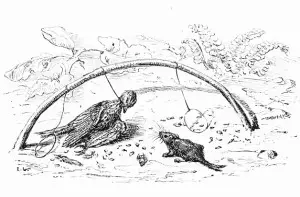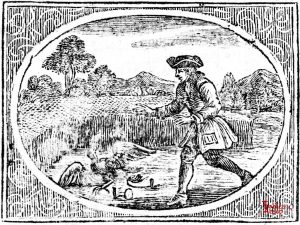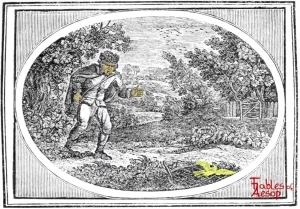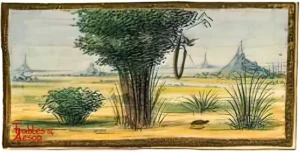A Lark was caught and sentenced to death. The Lark complained that punishment did not fit the crime as all he took was a grain of corn; not jewels. Too bad.
When your adversary is also your judge, don’t bother arguing.

JBR Collection (The Fowler and The Lark)
A Lark, caught in a snare, pleaded earnestly with the Fowler for her life. “What have I done that I must die?” said she; “I have stolen neither gold nor silver, but only a grain of corn to satisfy my hunger.” The Man, without deigning any reply, twisted her neck and threw her into his sack.

L’Estrange version
A poor lark enter’d into a miserable expostulation with a bird-catcher, that had taken her in his net, and was just about to put her to death. Alas (says she) what am I to dye for now? I am no thief; I have stoln neither gold, nor silver; but for making bold with one pityful grain of corn am I now to suffer.
Moral
‘Tis to no purpose to stand reasoning where the adversary is both party and judge.

Samuel Croxall (The Fowler and the Lark)
A FOWLER set snares to catch Larks in the open field. A Lark was caught; and finding herself entangled, could not forbear lamenting her hard fate. Ah! woe is me, says she, what crime have I committed? I have taken neither silver nor gold, nor any thing of value; but must die only for eating a poor grain of wheat.
THE APPLICATION
The irregular administration of justice in the world, is indeed a very melancholy subject to think of. A poor fellow shall be hanged for stealing a sheep, perhaps to keep his family from starving; while one, who is already great and opulent, shall, for that very reason, think himself privileged to commit almost any enormities. But it is necessary that a show and form of justice should be kept up; otherwise, were people to be ever so great, and so successful rogues, they would not be able to keep possession of, and enjoy their plunder. One of our poets, in his description of a court of justice, calls it a place,
Where little villains must submit to fate,
That great ones may enjoy the world in state.
What a sad thing it is to reflect (and the more sad, because not to be remedied) that a man may rob the public of millions, and escape at last; when he that is taken picking a pocket of five shillings, unless he knows how to make a friend, is sure to swing for it!

Thomas Bewick (The Fowler and The Lark)
A Fowler set his snares to catch birds in the open field. A Lark was caught; and finding herself entangled, could not forbear lamenting her hard fate. Ah! woe is me, says she, what crime have I committed that man should be plotting my destruction? I have not taken either his silver or gold, or any thing of value to him; and while other rapacious birds deal about destruction and go unpunished, I must die for only picking up a single grain of corn.
APPLICATION.
The irregular administration of justice in the world, is indeed a melancholy subject to think of. A poor fellow shall be hanged for stealing a sheep, perhaps to keep his family from starving; while one, who is already great and opulent, will not scruple to add to his overflowing wealth by the most bare-faced [s]peculation upon the public, and yet shall escape punishment, and even censure, through powerful interest with those who ought to be his judges, but allow themselves to be swayed by the splendour of his connections, or corrupted by his money. When justice is intrusted in such hands, then shall we see the description given by one of our satirical poets, of a corrupt court of law, realized. He calls it a place,
Where little villains must submit to late, That great ones may enjoy the world in state.
However, let no one, who violates the law, rest his defence on this plea; for though crimes, committed by his superiors, ought not to escape with impunity, yet his own nevertheless deserve punishment. Hence we may also draw a hint, not unworthy of our attention, to endeavour to preserve our own integrity, unshaken in the midst of iniquity, and to shew ourselves unstained by the corruption even of the worst of times.
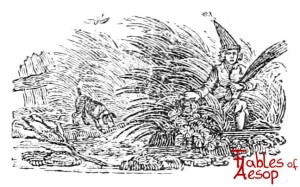

Gherardo Image from 1480

Galerita Laqueo Capta
Galerita, cum laqueo capta esset, “Heu me miseram,” plorans aiebat, “atque infelicissimam volucrem! Aurum nemini, nec argentum, nec quidquam aliud pretiosum surripui, atqui parvum tritici granum mortis mihi causa fuit.”
Perry #251
